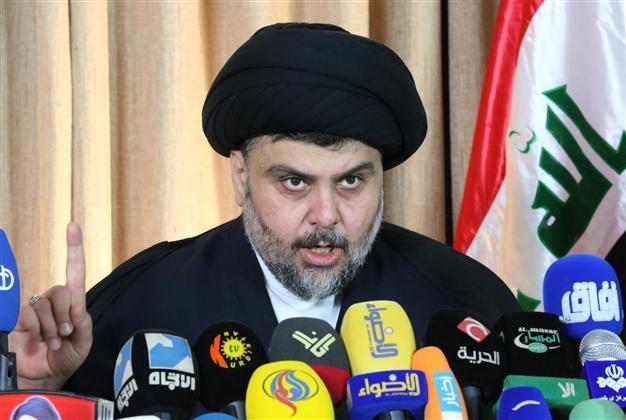Powerful cleric Sadr slams Iraq govt, 'tyrant' PM
BAGHDAD - Agence France Presse

Iraqi Shiite cleric Moqtada al-Sadr delivers a speech from the southern Iraqi city of Najaf on February 18, 2014. AFP Photo
Powerful Shiite cleric Moqtada al-Sadr on Tuesday slammed Iraq's government as corrupt and its leader as a "tyrant" while calling on citizens to vote, days after announcing his exit from politics.
The televised speech seemed aimed at establishing the cleric, who leapt to prominence with his fierce criticism of the 2003 US-led invasion, as a figure above the everyday Iraqi political fray.
"Politics became a door for injustice and carelessness, and the abuse and humiliation of the rule of a dictator and tyrant who controls the funds, so he loots them... and the cities, so he attacks them, and the sects, so he divides them," Sadr said.
He was apparently referring to Prime Minister Nuri al-Maliki, whom he has repeatedly criticised in the past.
Sadr called on Iraqis to vote in parliamentary elections that are now a little more than two months away.
Iraqis "must participate in these elections in a major way, so that the government does not fall into the hands of the dishonest," Sadr said.
He also reaffirmed his weekend announcement that he was separating himself from his powerful political movement, which holds dozens of parliamentary seats and six ministerial posts.
"I will remain for all -- not for the Sadrists only, for I dedicated myself to Iraq and to Islam," Sadr said in comments indicating he still could play an influential role in Iraq's political future.
Sadr's rise was aided by the reputations of two famed relatives -- including his father, Mohammed Mohammed Sadiq al-Sadr -- who were killed during Saddam Hussein's rule.
Sadr was also the commander of the Mahdi Army, a widely-feared militia that battled US forces and played a key role in the brutal Sunni-Shiite sectarian conflict in which thousands of people were killed.
He later suspended the militia's activities and in recent years his focus has increasingly shifted to religious studies in both Iran and Iraq that have taken him out of the country for extended periods of time.
In his weekend statement, Sadr said the decision to leave politics was taken from the standpoint of Islamic law and of "preserving the honourable reputation of Sadr, especially of the two Sadr martyrs" -- referring to his father and Mohammed Baqr al-Sadr, who were killed during Saddam's rule.
The move also aims to "end all the corruptions that occurred or which are likely to occur" that would harm the Sadr reputation, he said.
Sadr said his movement's political offices would be closed, but that others related to social welfare, media and education would remain open.
He has left politics before only to resurface later on, but the fact that Sadrist MPs also announced their resignations "makes this appear more serious" than past departures, said Kirk Sowell an Amman-based political risk analyst and the publisher of Inside Iraqi Politics.
Sadr "usually backs out of the political limelight when he is physically threatened" or "when the Sadrist movement has to do something politically expedient that Sadr wants to disassociate from," said Michael Knights, a fellow at the Washington Institute for Near East Policy.
Of Sadr's possible return, Knights said: "Nothing is permanent in Iraq except death."
